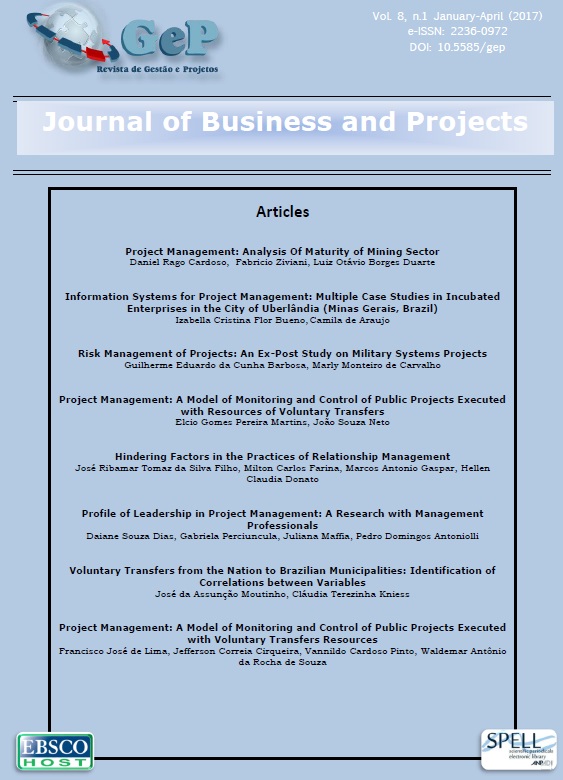Project Management: A Model of Monitoring and Control of Public Projects Executed with Resources of Voluntary Transfers
DOI:
https://doi.org/10.5585/gep.v8i1.311Keywords:
Project management, Public administration, Voluntary transfers.Abstract
The increasing social demand for quality public services and the reach of all, in contrast to the decrease in public revenues in recent years, give the resources derived from the voluntary transfers of the Union a fundamental role in the execution of the projects of the state executive power. In a state in which investment resources depend on voluntary transfers, lack of planning when funding and execution, together with the absence of a state tool for monitoring and controlling these resources, lead to financial and social losses that are difficult to repair. The general objective of this article is to propose a routine and a management tool able to monitor, in a timely manner, the budgetary, financial and physical execution of all phases of the projects within the scope of the state executive power, executed with funds from voluntary transfers. It is a qualitative research of exploratory and descriptive character, based on a case study. The main results are: the identification of the total of agreements in execution and the sum of resources returned in the last years, besides the proposal of a routine and monitoring tool. It is suggested that future research should advance in the causes of failure of individual projects.
References
Abboubi, M.El., Cornet, A. (2012) Towards a dynamic stakeholder management framework for CSR Certifications. International Journal Of Business And Social Science. 3(5), 1-12.
Brailsford, S.C. et al. (2009) Stakeholder engagement in health care simulation. In: Proceedings of the 2009 winter simulation conference, 2009, Southampton. Austin, TX, USA. 1840 - 1840.
Bramont, P.(2012) Maturidade em governança corporativa: diretrizes para um modelo preliminar. 131 f. Dissertação – Mestrado em Gestão do Conhecimento e Tecnologia da Informação, Universidade Católica de Brasília, Brasília.
Carrillo, E., O’Neill et al. (2010) Experiences with stakeholder engagement in transitioning to an increased use of renewable energy systems. In: IEEE International Symposium on Sustainable Systems and Technology, Arlington,USA. 1 - 6.
Cavalcante, M.M. (2013) Engajamento no trabalho, bem-estar no trabalho e capital psicológico: um estudo com profissionais da área de gestão de pessoas. Dissertação Mestrado em Administração, Universidade Metodista de São Paulo, São Bernardo do Campo, Brasil
Deverka, P. et al. (2013) Stakeholder participation in comparative effectiveness research: defining a framework for effective engagement. J Comp Eff Res. 1(2), 1-19.
Eskerod, P., Huemann, M. (2013) Sustainable development and project stakeholder management: what standards say. International Journal Of Managing Projects In Business. 6(1), 36-50.
Gopnik, M. et al. (2012) Coming to the table: early stakeholder engagement in marine spatial planning. Marine Policy. 36, 1139-1149.
Gould, R.W. (2012) Open innovation and stakeholder engagement. Journal Of Technology Management & Innovation, 7(3), 1-11.
Gui, R.T.(2003) Grupo focal em pesquisa qualitativa aplicada: intersubjetividade e construção de sentido. Revista Psicologia, Florianópolis, 3(1), 1-10, jun.
Lo, Yin-Hsi. (2013) Stakeholder management in the chinese hotel industry: the antecedents and impacts. International Journal Of Contemporary Hospitality Management. 25(4), 470-490.
Martins, J., Correia, N. (2013) Validação da versão portuguesa do questionário utrecht work engagement para medir o engagement no trabalho nos profissionais dos cuidados de saúde primários. Dissertação. Mestrado em Gestão de Serviços de Saúde, Instituto Universitário de Lisboa, Lisboa, Portugal.
Meding, J. V. et al. (2013) A framework for stakeholder management and corporate culture. Built Environment Project And Asset Management, 3(1), 24-41.
Moreira, A. F., Pontelo, I.(2009) Níveis de engajamento em uma atividade prática de Física com aquisição automática de dados. Revista Brasileira de Pesquisa em Educação em Ciências, 8(2), 148-167.
Moresi, E. (2003) Metodologia da pesquisa. Recuperado em: 17 set.2014, de em: http://www.inf.ufes.br/~falbo/files/MetodologiaPesquisa-Moresi2003.pdf. Acesso em:17 set. 2014
Peterson, H. C. (2013) Fundamental principles of managing multi-stakeholder engagement. International Food And Agribusiness Management Review. Michigan, 16, 11-22.
PMI. Project Management Institute (ed.) (2013) A guide to the project management body of knowledge – PMBok. 5th. Ed., Newtown Square, Pennsylvania, PMI Publishing Division.
Schaufeli, W. B. (2002) The measurement of engagement and burnout: a two sample confirmatory factor analytic approach. Journal of happiness studies. 3, 71-92.
Schaufeli, W., Bakker, A. (2003) Uwes – Utrecht work engagement scale preliminary Manual. Recuperado em: 26 set.2014, de: .
Schaufeli, W.B., Bakker, A.B., Salanova, M. (2006) The measurement of work engagement with a short questionnaire A Cross-National Study. Sage. 66(4), 701-716.
Schaufeli, W.B. (2012) The measurement of work engagement. In R.R. Sinclair, M. Wang & L.E. Tetrick Research methods in occupational health psychology: measurement, design, and data analysis. New York, USA. 138-153.
Silva, M.G. et al.(2013) Publicações que utilizaram o grupo focal como técnica de pesquisa: o que elas nos ensinam? Ciência Cuidado Saúde, [s.l], 12(2), 398-406, jun.
Wefald, A. J. et al. (2012) A comparison of three job engagement measures: examining their factorial and criterion-related validity. The International Association Of Applied Psychology. 4(1), 67-90.
Wei, S., Yalin, W. (2008) Formulating strategies for stakeholder management: a case-based reasoning approach. In: International conference on wireless communications, networking and mobile computing. Ieee, Dalian, Chine, 1-5, October.
Yang, J et al. (2010) Critical success factors for stakeholder management: construction practitioners' perspectives. Journal Of Construction Engineering And Management. 136, 778-786.
Yang, J. et al. (2011) Stakeholder management in construction: an empirical study to address research gaps in previous studies. International Journal of Project Management, 29, 900-910.
Yip, M.H., Phaal, R.P., David R. (2013) Stakeholder engagement in early stage product-service system development for healthcare informatics. In: Technology Management for Emerging Technologies. Proceedings of Picmet. San Jose, California, USA, 2564 - 2574.
Downloads
Published
How to Cite
Issue
Section
License
Copyright (c) 2017 Elcio Gomes Pereira Martins, João Souza Neto

This work is licensed under a Creative Commons Attribution-NonCommercial-NoDerivatives 4.0 International License.







